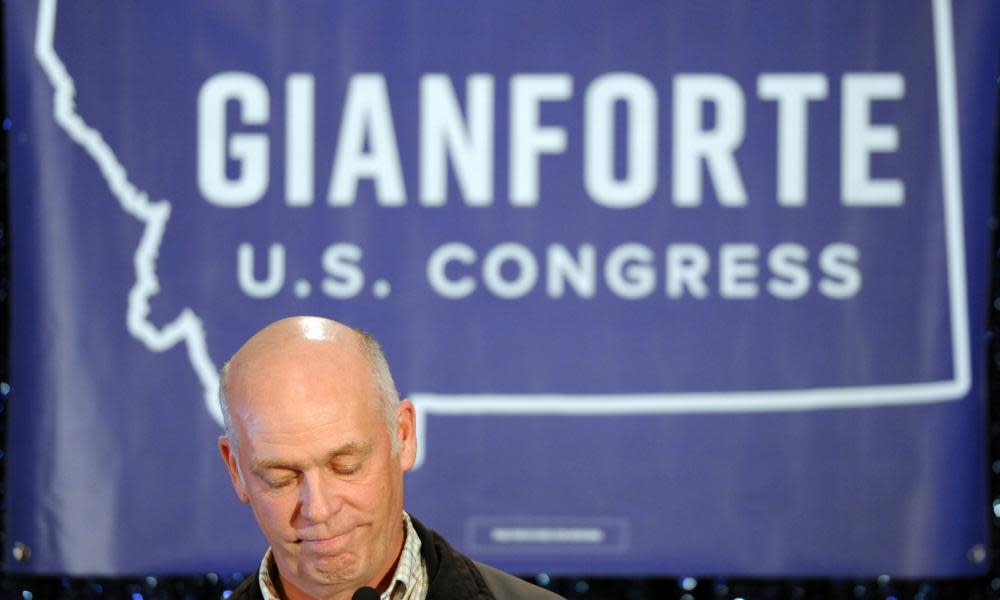Republicans must not tolerate the violence of Greg Gianforte | Lucia Graves

Republican Greg Gianforte won a special congressional election in Montana Thursday, the day after assaulting a reporter. In light of his conduct, it’s incumbent upon Paul Ryan, the most senior Republican in Congress, to show the world that Republicans don’t condone the violent behavior of their newest member.
Gianforte’s actions violates the first duty of a politician in a democracy, which is to work through one’s policy differences and answer questions about them peacefully. And his conduct Wednesday was not that of an elected official. The Republican party still has the opportunity to say as much.
In the coming weeks, Ryan will preside over the seating of Gianforte, and though our justice system doesn’t dictate what he and Republicans in Congress must do, moral imperative dictates he must do something.
That Gianforte did finally apologize after he’d won, declaring that he had “made a mistake,” is small comfort. Grabbing a reporter and throwing him to the ground is not an accident; the act was done in anger, sure, but it was also done with physical intent.
So far the Speaker has scolded Gianforte in only the softest terms. “Should the gentleman apologize?” Ryan said. “Yeah, I think he should apologize.” With all due respect Mr Speaker, “the gentlemen” of whom you speak is anything but gentle and he has no business in the halls of Congress.
Now it’s up to him and Republican leadership to say as much.
The Constitution mandates each chamber of Congress “determine the rules of its proceedings, punish its members for disorderly behavior, and, with the concurrence of two thirds, expel a member.” Such language strongly suggests some action by leadership is warranted.
In 1969, the supreme court ruled to prohibit Speakers from unilaterally barring incoming lawmakers from being seated in the House, but there are no shortage of intermediate actions Ryan might take.
He could seat Gianforte and then subsequently move for a vote on expulsion. Alternatively, he could refer him to the House Committee on Ethics, which polices members’ behavior. More simply, he could use his public platform to censure Gianforte’s behavior in stronger terms.
Instead Ryan has signaled he will move to seat Gianforte as smoothly as possible, and do so by appealing to the very democracy that Gianforte’s assault deteriorates. “If he wins, he has been chosen by the people of Montana,” Ryan said.
But many Montanans didn’t know this side of the man they voted for.
An estimated two thirds of early voters cast their ballots before he assaulted a reporter, and before they knew his position on the Republican health care bill that the reporter, my colleague Ben Jacobs, was asking about. He still has not taken a public position on the bill.
That Gianforte’s violent response to being asked a policy question has actually been rewarded within certain circles of the Republican party is a measure of just how toxic our culture of masculinity has become.
Gianforte’s team claims to have raised $100,000 following the attack and the president and vice president have hailed the victory. When the congressman-elect referred to the incident at his victory party, members of the crowd at his victory party sniggered.
That culture was distilled by numerous Fox News commentators defending Gianforte and in a tweet by Laura Ingraham. “Did anyone get his lunch money stolen today and then run to tell the recess monitor?” she wrote.
Ingraham offered us an unwittingly and satisfyingly accurate description of Gianforte as a bully and a thug. This kind of aggressiveness is ascendant in the Republican party and is being fostered by Trump. It deserves the scorn and condemnation of every self-respecting, law-abiding Republican.
If the Republican party loves manliness so much, Paul Ryan should have courage enough to set the record straight with regard to where he and his party stand.

 Yahoo News
Yahoo News 
